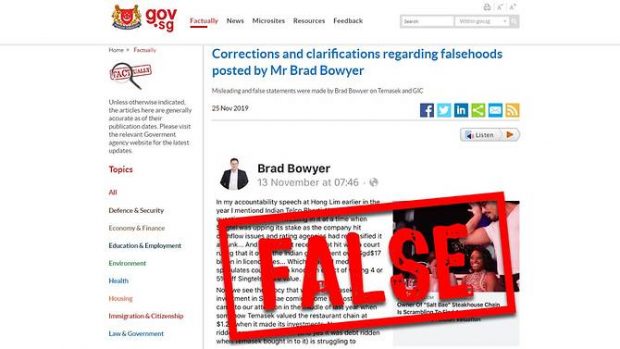
Singapore Press Watch: Unexpected responses to fake law strictures

By Ivan Lim
Contributor to AsiaN
Singapore: The Singapore authorities’ invoking of a new law on fake news to call out two political commentators has met with unexpected responses: while one has complied with an order to post a correction, but not unequivocally, the other has refused to do so.
The Office of the Protection from Online Falsehoods and Manipulation Act (Pofma) ruled that a Facebook post on Nov 13 by a member of the opposition Progress Singapore Party (PSP), Brad Bowyer was factually wrong. It had misrepresented the government’s role as one of control over Temasek Holdings, the state sovereign wealth fund, and the Government Investment Company (GIC), including influencing its commercial decision-making moves.
Bowyer’s account remained in his Facebook post, but he had to include a link to an article in the state fact-checking website, Factually, that set out the government’s version of Temasek and GIC’s operations.
In fact, the government rebuttal said both entities work on market principles, independent of the government. It described Bowyer’s statements as false and misleading, and smeared the reputation of Temasek and GIC.
Mr Bowyer’s post had undermined trust in the government, said Finance Minister Heng Swee Keat who dealt with the case that fell under his domain.
An apologetic Bowyer, nevertheless, argued what he had posted, including references to Temasek investments in loss-making enterprises, was “fair comment”.
“I did not feel I am using false and misleading statements to smear Temasek or GIC, just using publicly available data to question their decision-making and, more importantly, the government oversight of them,” he said, noting that Prime Minister Lee Hsien Loong is the GIC chairman, and his wife, Ho Ching, chief executive officer of Temasek.
In the second infringement case, the Pofma Office cited the Australian-based editor of the website States Time Review (STR), Mr Alex Tan, for a Facebook post on Nov 23 that said a whistle blower who had sought to expose the Christian credentials of a potential ruling People’s Action Party (PAP) candidate had been arrested. It also said that the owner of the USSU- NUS Students United Facebook page that publicised the claims about the PAP candidate was under police investigation.
Incidentally, the NUSSU- Students’ United page is a spoof of the National University of Singapore Students Union.
“These claims are false and baseless. No one has been arrested and charged arising from the NUSSU post,” said the Ministry of Home Affairs, which dealt with the issue under its ambit.
However, the Pofma Office’s correction directive has been rejected by STR’s Alex Tan, who is now an Australian citizen, saying he would not “comply with any order from a foreign government”. He had maintained that the government’s rebuttal was “contrary to tip-offs we had received”.
Instead, Facebook itself removed the STR post as not conforming to community and authenticity standards.
The Pofma’s prerogative in ruling what is truth or falsehood has renewed worries that concerned Singaporeans might be fearful of or discouraged from voicing their honest views on public issues.
On Tuesday, the Progress Singapore Party criticised the Pofma action against Mr Bowyer. It said in its website that the minister’s correction directive “does not measure up to the standards of transparency, and accountability.
Rebutting, the Ministry of Communications and Information (MCI) and Ministry of Law (MinLaw) said the minister is bound by law to specify why the statements in question are false.
He also goes by legal precedents on how falsehoods are determined.
The PSP also contends that the courts, acting independently, should decide what is false and what penalties to mete out.
“The courts would also have an established system and precedents of determining falsehoods from its handling of cases of fraud, thereby ensuring transparency and accountability,” said the party.
No, the minister cannot impose any penalties arbitrarily, said MCI and MinLaw. If the Minister’s directive is challenged, only the courts can set the penalties in line with legal principles after hearing, the two ministries added.
Commenting on the impact of the Nov 25 Pofma rulings on free speech, Singapore Management University law don Eugene Tan said: “…People can see that Pofma (was) properly invoked’’.
Mr Bowyer’s original Facebook post stays side by side with the correction. He was also not barred from posting further comments on the issue.
Hence, there was no question of quelling dissent or shutting out opposing views.
That said, “while people are entitled to their views, they are not entitled to inaccurate facts”.


